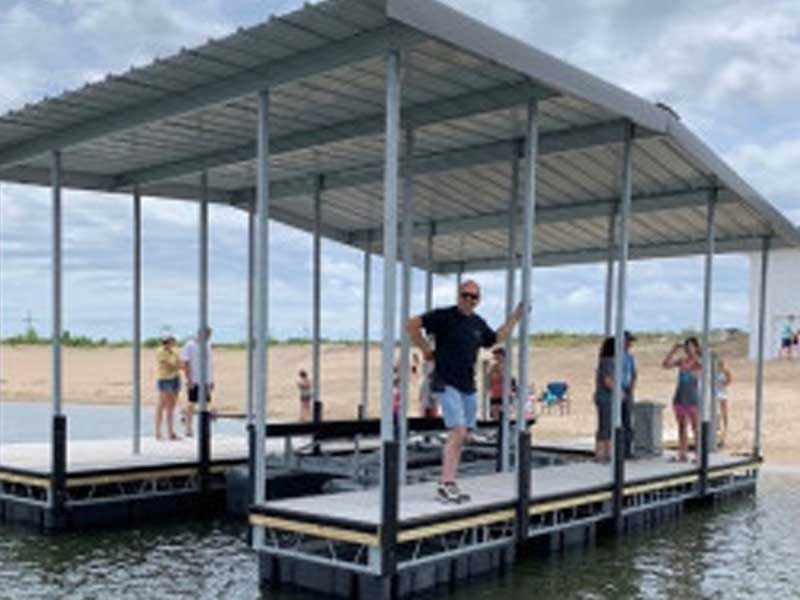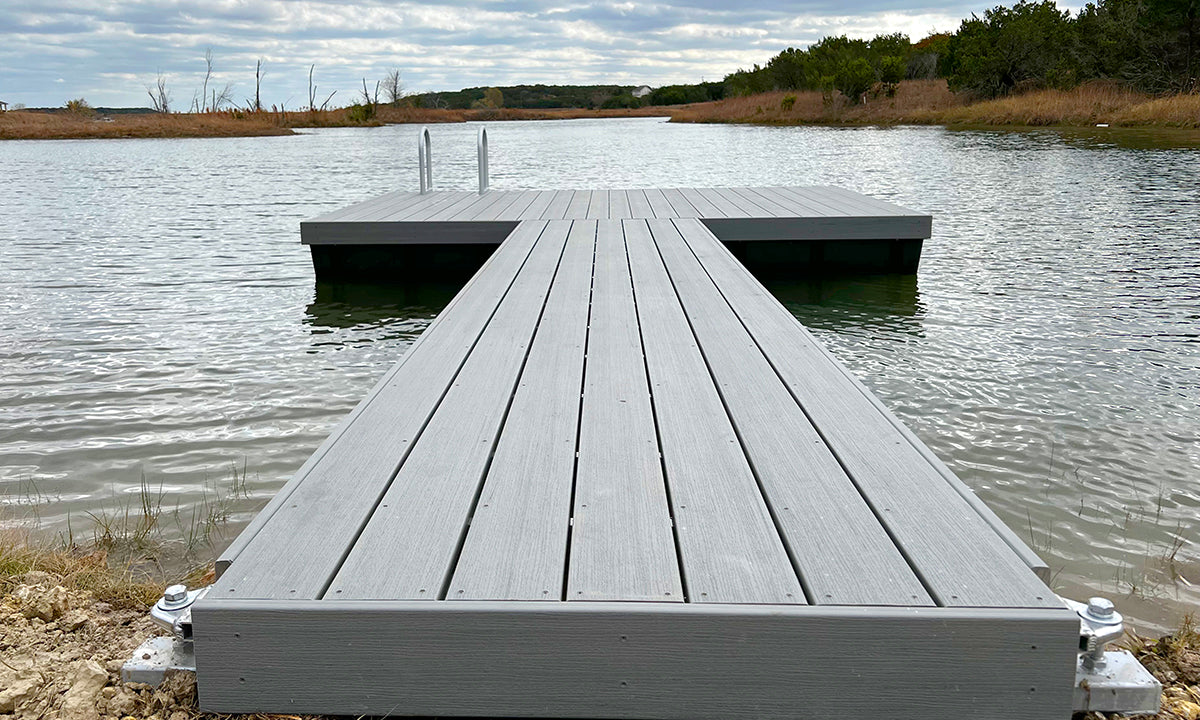Picking the Right Dock Company: Aspects to Think About for a Seamless Setup
Picking the Right Dock Company: Aspects to Think About for a Seamless Setup
Blog Article
Why Floating Docks Are the Perfect Option for Your Beachfront Requirements
Floating docks present a compelling service for beachfront demands, particularly due to their flexibility to rising and fall water levels and their robust, modular design. As we explore the complex benefits and applications of floating docks, it becomes obvious why they stand out in the realm of waterside infrastructure-- especially when thinking about the long-lasting benefits they offer for various stakeholders.
Secret Benefits of Floating Docks
The flexibility of floating docks deals many benefits for waterside applications, making them an increasingly popular option amongst marina operators and home programmers. One of the main benefits is their flexibility to varying water degrees, which permits them to continue to be useful in different settings, consisting of lakes, rivers, and coastal locations. Unlike typical set docks, floating docks can fall and increase with the trends and seasonal changes, ensuring regular ease of access.
Additionally, floating docks are typically simpler and more economical to maintain and set up. Their modular layout helps with fast setting up, minimizing labor prices and building and construction time. Furthermore, the materials made use of in floating dock building and construction are frequently resistant to deterioration, ensuring durability with minimal maintenance.
Safety is one more vital benefit; the resilient nature of these docks decreases the danger of crashes during boarding and getting off, making them especially appealing for family-oriented facilities. Last but not least, their ecological influence is less than that of fixed frameworks, as they do not interrupt aquatic ecological communities. Collectively, these benefits setting floating docks as a superior service for an array of beachfront requirements, lining up with both operational effectiveness and eco-friendly factors to consider.
Ideal Applications for Various Activities
Adaptability is a characteristic of floating docks, making them ideal for a variety of activities across various waterside settings. These flexible structures can function as ideal platforms for leisure activities such as boating, fishing, and swimming. Their buoyant nature enables very easy accessibility to boat, allowing smooth departure and disembarkation, while likewise supplying a stable area for fishermens to cast their lines.
In commercial settings, floating docks assist in the loading and dumping of products, suiting both little and huge vessels. They are especially useful in areas with ever-changing water levels, guaranteeing that procedures continue to be nonstop. In addition, floating docks can be used for waterfront dining and home entertainment, supplying a one-of-a-kind and picturesque experience for customers.
Ecological applications are additionally noteworthy; floating docks can work as monitoring platforms for wild animals enjoying or as docking terminals for study vessels participated in eco-friendly research studies. As marina expansions become a lot more widespread, these docks offer a functional solution for raising ability without substantial land changes. Eventually, the convenience of floating docks makes them a recommended choice for any person looking for effective and practical waterside services.
Layout and Personalization Alternatives
Floating docks not only provide to varied tasks but likewise supply a series of layout and modification alternatives that enhance their functionality and visual charm. These functional structures can be customized to fit details waterfront needs, whether for residential, industrial, or entertainment functions.
One trick aspect of personalization is the selection of products. Alternatives vary from high-density polyethylene to light weight aluminum, each supplying one-of-a-kind advantages in regards to resilience and maintenance. In addition, the arrangement of the dock can be adjusted to pop over here suit different water degrees and environmental conditions, guaranteeing stability and safety and security.
Layout functions can include incorporated seats, railings, and lights, which not only improve usability however also improve the aesthetic aspect of the dock. Personalized coatings and shades enable owners to match the dock with existing structures or personal choices, creating a cohesive search for the beachfront.
Furthermore, floating docks can be designed with modular areas, making it possible for very easy growth or reconfiguration as requirements alter. This flexibility is especially valuable for growing family members or progressing business. Overall, the substantial design and personalization choices available make floating docks a very adaptable service for any type of waterside setting.
Installation and Upkeep Considerations
Usually, successful setup and upkeep of floating docks call for careful preparation and attention to information. Prior to beginning installment, it is essential to analyze the certain site conditions, consisting of water depth, wave action, and regional regulations. This first assessment informs the selection of materials and design, making sure the dock will certainly endure ecological tensions.

Upkeep is just as crucial to lengthen the lifespan of the dock. Regular assessments ought to be carried out to recognize damage, specifically on flotation protection devices, adapters, and outdoor decking. Cleansing the dock regularly helps protect against the build-up of algae and debris, which can compromise surface area honesty and aesthetic appeals.
Furthermore, seasonal preparations, find such as removing devices and securing the dock throughout severe climate, can stop damage. By focusing on appropriate installment and regular upkeep, proprietors can ensure their floating dock stays a trusted and useful beachfront service for several years to come.

Environmental Influence and Sustainability
The ecological influence of floating docks is an essential consideration for beachfront tasks, as these frameworks interact directly with water environments. dock company. Unlike traditional set docks, floating docks minimize interruption to the substrate, enabling for natural debris motion and minimizing disintegration. Their style enables water flow underneath, promoting healthy marine atmospheres and sustaining regional wildlife
Lots of floating docks are created from sustainable products, such as green compounds and recycled plastics, which minimize the carbon impact connected with manufacturing. Moreover, contemporary styles integrate features that improve environmental sustainability, such as absorptive surface areas that help with water filtering and decrease pollution.
Floating docks also offer an excellent system for habitat remediation by sustaining the growth of water plants and offering shelter for fish my explanation and other aquatic organisms. By consisting of attributes like fish habitats and immersed growings, floating docks can boost biodiversity in the location.
In addition, these structures can be developed to suit photovoltaic panels, supplying eco-friendly power choices that even more reduce their ecological effect (dock company). In general, floating docks represent a sustainable solution that stabilizes human use waterfronts with the conservation of important communities
Final Thought
In final thought, floating docks existing a very adaptable and sustainable service for diverse beachfront requirements. Their modular style, combined with making use of resilient, corrosion-resistant products, ensures longevity and simplicity of maintenance. The flexibility of floating docks accommodates different applications, varying from recreational tasks to business operations while decreasing environmental influence. Ultimately, the customizable attributes and ability for development further solidify floating docks as an ideal option for any waterside task.
Floating docks present a compelling solution for waterfront needs, especially due to their adaptability to changing water levels and their robust, modular design. Unlike traditional set docks, floating docks can fall and increase with the tides and seasonal modifications, making certain consistent accessibility.
Collectively, these benefits placement floating docks as a premium option for an array of waterside needs, aligning with both operational performance and environmental factors to consider.
In general, the extensive layout and personalization choices offered make floating docks a highly adaptable remedy for any type of waterfront setting.
Unlike standard fixed docks, floating docks reduce interruption to the substrate, allowing for natural debris motion and lowering disintegration.
Report this page